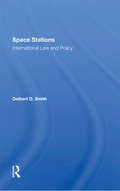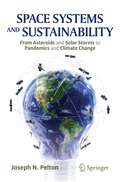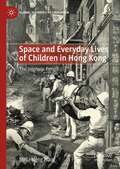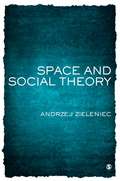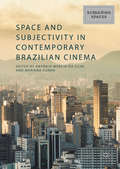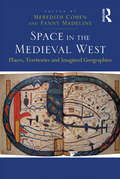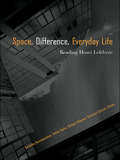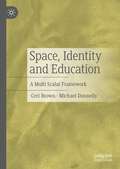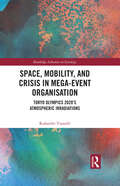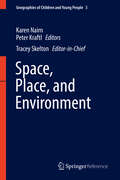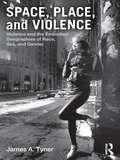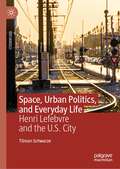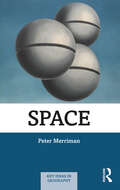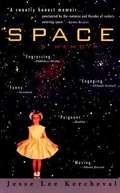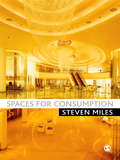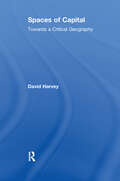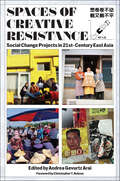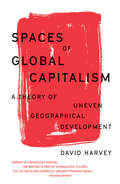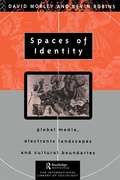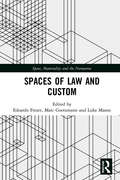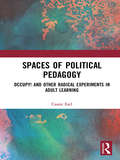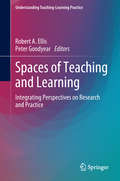- Table View
- List View
Space Policy Alternatives
by Radford Byerly Jr."In 1989 I edited a somewhat similar group of essays published by Westview under the title Space Policy Reconsidered. The preface to that volume began with this statement: For some time space policy debate has been too constrained by pre-existing assumptions and programs. There is also a related need for a community of independent space policy analysts in order to inform those discussions. The aim of this book is to take a step toward meeting such needs. That statement is repeated here because it is still valid - and this book is intended to address the same unmet needs."
Space Stations: International Law And Policy
by Delbert D. SmithThis book explores the international law and policy relating to space stations in terms of specific barriers to utilization and considers methods or policies designed to overcome perceived barriers. It deals with the institutional possibilities and alternatives for space station ownership.
Space Systems and Sustainability: From Asteroids and Solar Storms to Pandemics and Climate Change
by Joseph N. PeltonIn his latest book, space scientist, futurist, and educator Joseph N. Pelton explores adozen ways that Planet Earth is at “existential” risk, along with the many ways thatspace systems, data analytics, and advanced networking systems can help us copewith these global challenges.The chapters examine in a straightforward way how satellite systems and technol-ogy can drastically transform fields such as pandemic tracking and global medicalresponses, cosmic hazard monitoring, nuclear energy and waste disposal, water andland pollution, tele-education/telemedicine, and military conflict. Such examplesshow how orbiting smart systems will play an ever more vital role in our vulnerablemodern world, allowing us to monitor, track, and respond to mounting problems ofthe 21st century.Dr. Pelton takes a broad view, probing the social, economic, and regulatory factorsthat are crucial to creating a more sustainable “Spaceship Earth.” This book is a callto action, promoting more organized international collaboration and investment in space technologies that can enable global change.
Space and Everyday Lives of Children in Hong Kong: The Interwar Period (Global Histories of Education)
by Stella Meng WangDeploying a spatial approach towards children’s everyday life in interwar Hong Kong, this book considers the context-specific development of five transnational movements: the garden city movement; imperial hygiene movement; nationalist sentiments; the Young Women's Christian Association; and the Girl Guide. Locating these transnational cultural movements in four layers of context, from the most immediate to the most global, including the context of Hong Kong, Republican China, the British empire, and global influences, this book shows Hong Kong as a distinctive colonial domain where the imperatives around race, gender and class produced new products of empire where the child, the garden, the school and sport turned out to be the main dynamics in play in the interwar period.
Space and Social Theory (BSA New Horizons in Sociology)
by Dr Andrzej ZieleniecThe importance of the spatial dimension of the structure, organization and experience of social relations is fundamental for sociological analysis and understanding. Space and Social Theory is an essential primer on the theories of space and inherent spatiality, guiding readers through the contributions of key and influential theorists: Marx, Simmel, Lefebvre, Harvey and Foucault. Giving an essential and accessible overview of social theories of space, this books shows why it matters to understand these theorists spatially. It will be of interest to upper level students and researchers of social theory, urban sociology, urban studies, human geography, and urban politics.
Space and Subjectivity in Contemporary Brazilian Cinema
by Antônio Márcio da Silva Mariana CunhaThis edited volume seeks to provide new perspectives on space and subjectivity in contemporary Brazilian cinema for the first time in English. Through diverse theoretical and methodological approaches, contributors discuss the themes of space and subjectivity in their connection to various topics and concepts, including: territorialization and marginalized subjectivities; intensity, affect and spatial experience; utopia, memory and urban architecture; natural spaces and landscapes; gendered and queer spaces; domestic spaces, social differences and class struggle.
Space in the Medieval West: Places, Territories, and Imagined Geographies
by Fanny MadelineIn the last two decades, research on spatial paradigms and practices has gained momentum across disciplines and vastly different periods, including the field of medieval studies. Responding to this ’spatial turn’ in the humanities, the essays collected here generate new ideas about how medieval space was defined, constructed, and practiced in Europe, particularly in France. Essays are grouped thematically and in three parts, from specific sites, through the broader shaping of territory by means of socially constructed networks, to the larger geographical realm. The resulting collection builds on existing scholarship but brings new insight, situating medieval constructions of space in relation to contemporary conceptions of the subject.
Space, Difference, Everyday Life: Reading Henri Lefebvre
by Stefan Kipfer Kanishka Goonewardena Richard Milgrom Christian SchmidIn the past fifteen years, Henri Lefebvre’s reputation has catapulted into the stratosphere, and he is now considered an equal to some of the greats of European social theory (Bourdieu, Deleuze, Harvey). In particular, his work has revitalized urban studies, geography and planning via concepts like; the social production of space, the right to the city, everyday life, and global urbanization. Lefebvre’s massive body of work has generated two main schools of thought: one that is political economic, and another that is more culturally oriented and poststructuralist in tone. Space, Difference, and Everyday Life merges these two schools of thought into a unified Lefebvrian approach to contemporary urban issues and the nature of our spatialized social structures.
Space, Identity and Education: A Multi Scalar Framework
by Michael Donnelly Ceri BrownThis book details an innovative multi-scalar framework to examine the intersection of spatial levels in shaping social justice issues in education. Including an examination of key dimensions such as geographic divisions (between and within countries), school design, online learning, home-schooling, and student mobility, the framework is applied to analyse the interrelation between space, identity, and education. The authors reveal how this novel integration of scales is essential for a more comprehensive and probing understanding of educational inequalities. As an example of theoretical interdisciplinarity mobilised to tackle the urgent issues of our time, the twin dimensions of space and identity, discussed at multi-scalar levels, provides an invaluable theoretical resource for scholars and students of education, sociology and geography.
Space, Mobility, and Crisis in Mega-Event Organisation: Tokyo Olympics 2020's Atmospheric Irradiations (Routledge Advances in Sociology)
by Rodanthi TzanelliThis book advances an alternative critical posthumanist approach to mega-event organisation, taking into account both the new and the old crises which humanity and our planet face. Taking the delayed Tokyo 2020 Olympic Games as a case study, Tzanelli explores mega-event crisis and risk management in the era of extreme urbanisation, natural disasters, global pandemic, and technoscientific control. Using the atmospheric term ‘irradiation’ (a technology of glamour and transparency, as well as bodily penetration by harmful agents and strong affects), the book explores this epistemological statement diachronically (via Tokyo’s relationship with Western forms of domination) and synchronically (the city as a global cultural-political player but victim of climate catastrophes). It presents how the ‘Olympic enterprise’s’ ‘flattening’ of indigenous environmental place-making rhythms, and the scientisation of space and place in the Anthropocene lead to reductionisms harmful for a viable programme of planetary recovery. An experimental study of the mega-event is enacted, which considers the researcher’s analytical tools and the styles of human and non-human mobility during the mega-event as reflexive gateways to forms of posthuman flourishing. Crossing and bridging disciplinary boundaries, the book will appeal to any scholar interested in mobilities theory, event and environment studies, sociology of knowledge and cultural globalisation.
Space, Place, and Environment
by Tracey Skelton Karen Nairn Peter KraftlThis volume demonstrates the multiple ways that space, place and environment interact with children and young people’s lives. The contributors offer a suite of cutting-edge tools and lively examples for theorising how space, place and environment are (con)figured in children and young people’s lives. They demonstrate how the social borders between childhood and adulthood, and spatial borders between rural and urban, countries, neighbourhoods, and institutions, are relationally produced. The volume is organised into five sections: Indigenous Youth: Space and Place; Children, Nature and Environmental Education; Urban Spaces; Home/less Spaces; and Border Spaces. These themes signal the major issues in cutting-edge children’s geographies scholarship. Diverse geographical contexts are covered in this volume – including Australia, Brazil, Canada, Cyprus, Ecuador, India, Indonesia, Kazakhstan, Mexico, Morocco, New Zealand, Peru, Slovenia, Spain, the United Kingdom and the United States. All of the contributors advocate greater recognition of children and young people’s spatial rights, whether in the home, outdoors, at school, crossing borders, in public and digital spaces, or simply looking for a safe place to sleep. Children and young people’s perspectives on space, place and the environment, and their desire for places to call their own, tie the volume together. The volume is a testament to the politics of the spaces and places of childhood, highlighting how many children and young people face obstacles to living well and to living where they desire.
Space, Place, and Violence: Violence and the Embodied Geographies of Race, Sex and Gender
by James A. TynerDirect, interpersonal violence is a pervasive, yet often mundane feature of our day-to-day lives; paradoxically, violence is both ordinary and extraordinary. Violence, in other words, is often hidden in plain sight. Space, Place, and Violence seeks to uncover that which is too apparent: to critically question both violent geographies and the geographies of violence. With a focus on direct violence, this book situates violent acts within the context of broader political and structural conditions. Violence, it is argued, is both a social and spatial practice. Adopting a geographic perspective, Space, Place, and Violence provides a critical reading of how violence takes place and also produces place. Specifically, four spatial vignettes – home, school, streets, and community – are introduced, designed so that students may think critically how ‘race’, sex, gender, and class inform violent geographies and geographies of violence.
Space, Planning and Everyday Contestations in Delhi
by Surajit Chakravarty Rohit NegiThis insightful volume examines the politics andcontestations around urban space in India's national capital, Delhi. Movingbeyond spectacular megaprojects and sites of consumption, this book engageswith ordinary space and everyday life. Sites and communities analysed in thisvolume reveal the processes, relations, and logics through which the city'sgrand plans are executed. The contributors argue that urbanization isnegotiated and muddled, particularly in the spaces occupied by informal labour,resettled communities, and small-scale investors. The critical analyses in thisvolume shed light on the disjunctures between planning and ideology, narrativesof growth and realities of immobility, and facades of modernity and the spacesand practices produced in its pursuit. The book is organized in four parts -(I) Dis/locating Bodies, (II) Claims at the Urban Frontier, (III)Informalization and Investment, and (IV) Gendered Mobility. The studies reportcurrent empirical work from a variety of sites, investigating the dynamics ofcapital investment, state planning and citizen response in these spaces. Thesestudies, set in ordinary spaces in Delhi, reveal a subliminal disarray ofthought and action, stemming from the impetus to make the city attractive tocapital, while having to manage marginality and reorganize welfare functions. The volume provides fresh insights into the nature of urban planning andgovernance in an Indian megacity two decades after the neoliberal shift.
Space, Urban Politics, and Everyday Life: Henri Lefebvre and the U.S. City
by Tilman SchwarzeThis Book develops a novel and innovative methodological framework for operationalising Henri Lefebvre’s work for empirical research on the U.S. city. Building on ethnographic research on Chicago’s South Side, Tilman Schwarze explores the current situation of urbanisation and urban life in the U.S. city through a critical reading and application of Lefebvre’s writings on space, everyday life, the urban, the state, and difference. Focusing on territorial stigmatisation, public housing transformation, and urban redevelopment, this book makes an important contribution to critical urban scholarship, foregrounding the relevance and applicability of Henri Lefebvre’s work for geographical and sociological research on urban politics and everyday life.
Space: A Cultural-historical Geography Of England's M1 Motorway (Key Ideas in Geography #85)
by Peter MerrimanSpace is the first accessible text which provides a comprehensive examination of approaches that have crossed between such diverse fields as philosophy, physics, architecture, sociology, anthropology, and geography. The text examines the influence of geometry, arithmetic, natural philosophy, empiricism, and positivism to the development of spatial thinking, as well as focusing on the contributions of phenomenologists, existentialists, psychologists, Marxists, and post-structuralists to how we occupy, live, structure, and perform spaces and practices of spacing. The book emphasises the multiple and partial construction of spaces through the embodied practices of diverse subjects, highlighting the contributions of feminists, queer theorists, anthropologists, sociologists, and post-colonial scholars to academic debates. In contrast to contemporary studies which draw a clear line between scientific and particularly quantitative approaches to space and spatiality and more ‘lived’ human enactments and performances, this book highlights the continual influence of different mathematical and philosophical understandings of space and spatiality on everyday western spatial imaginations and registers in the twenty-first century. Space is possibly the key concept underpinning research in geography, as well as being of central importance to scholars and practitioners working across the arts, humanities, social sciences, and physical sciences.
Space: A Memoir
by Jesse Lee KerchevalKercheval remembers her days growing up in Florida, her mother addicted to Valium and her father turning into a workaholic.
Spaces for Consumption
by Steven MilesSpaces for Consumption offers an in-depth and sophisticated analysis of the processes that underpin the commodification of the city and explains the physical manifestation of consumerism as a way of life. Engaging directly with the social, economic and cultural processes that have resulted in our cities being defined through consumption this vibrant book clearly demonstrates the ways in which consumption has come to play a key role in the re-invention of the post-industrial city The book provides a critical understanding of how consumption redefines the consumers' relationship to place using empirical examples and case studies to bring the issues to life. It discusses many of the key spaces and arenas in which this redefinition occurs including: * shopping * themed space * mega-events * architecture Developing the notion of 'contrived communality' Steven Miles outlines the ways in which consumption, alongside the emergence of an increasingly individualized society, constructs a new kind of relationship with the public realm. Clear, sophisticated and dynamic this book will be essential reading for students and researchers alike in sociology, human geography, architecture, planning, marketing, leisure and tourism, cultural studies and urban studies.
Spaces of Capital: Towards a Critical Geography
by David HarveyDavid Harvey is the most influential geographer of our era, possessing a reputation that extends across the social sciences and humanities. Spaces of Capital, a collection of seminal articles and new essays spanning three decades, demonstrates why his work has had-and continues to have-such a major impact. The book gathers together some of Harvey's
Spaces of Creative Resistance: Social Change Projects in Twenty-First-Century East Asia
by Andrea Gevurtz Arai Yuyu Liu Yue Wu Yeonjung Ahn Miriam Timson Hyein Chae Chor-See Chan Summer Xuan Dai Liling Huang Jeff Hou Hidehiko Ishibashi Hsiu Fan Lin Yumi Matsubara Keisuke Sugano Jinyue XuSpaces of Creative Resistance: Social Change Projects in Twenty-First-Century East Asia brings together an exciting cross-regional interdisciplinary group of scholars, scholar activists, artists, and others for a collection that addresses the last two decades' hollowing out of social connections, socioeconomic income gaps, and general precarity of life in East Asian societies. Written by authors from China, Japan, South Korea, Taiwan, and Hong Kong, each chapter is focused on people making a difference together in socially sustainable ways, particularly in the areas of gender, labor, and environments—both built and natural. These projects all constitute acts of creative resistance to neoliberal development, and each act of creative resistance demonstrates how individuals and communities across East Asia are making new worlds and lifeways in the small and everyday. Taking on larger political and economic forces that affect their lives and communities, each project and group of individuals featured here is focused on making more liveable presents and more possible futures.
Spaces of Global Capitalism: A Theory of Uneven Geographical Development
by David HarveyFiscal crises have cascaded across much of the developing world with devastating results, from Mexico to Indonesia, Russia and Argentina. The extreme volatility in contemporary political economic fortunes seems to mock our best efforts to understand the forces that drive development in the world economy.David Harvey is the single most important geographer writing today and a leading social theorist of our age, offering a comprehensive critique of contemporary capitalism. In this fascinating book, he shows the way forward for just such an understanding, enlarging upon the key themes in his recent work: the development of neoliberalism, the spread of inequalities across the globe, and ‘space’ as a key theoretical concept.Both a major declaration of a new research programme and a concise introduction to David Harvey’s central concerns, this book will be essential reading for scholars and students across the humanities and social sciences.
Spaces of Hate: Geographies of Discrimination and Intolerance in the U.S.A.
by Colin FlintFirst published in 2004. Routledge is an imprint of Taylor & Francis, an informa company.
Spaces of Identity: Global Media, Electronic Landscapes and Cultural Boundaries (International Library of Sociology)
by David Morley Kevin RobinsWe are living through a time when old identities - nation, culture and gender are melting down. Spaces of Identity examines the ways in which collective cultural identities are being reshaped under conditions of a post-modern geography and a communications environment of cable and satellite broadcasting. To address current problems of identity, the authors look at contemporary politics between Europe and its most significant others: America; Islam and the Orient. They show that it's against these places that Europe's own identity has been and is now being defined. A stimulating account of the complex and contradictory nature of contemporary cultural identities.
Spaces of Law and Custom
by Edoardo FrezetThis collection brings together a carefully curated selection of researchers from law, sociology, anthropology, philosophy, history, social ontology and international relations, in order to examine how law and custom interact within specific material and spatial contexts. Normativity develops within these contexts, while also shaping them. This complex relationship exists within all physical places from traditional agrarian spaces to the modern shifting post-industrial workplace. The contributions gathered together in this volume explore numerous examples of such spaces from different disciplinary perspectives to interrogate the dynamic relationship between custom and law, and the material spaces they inhabit. While there are a dynamic series of conclusions regarding this relationship in different material realities, a common theme is pursued throughout: a proper understanding of law and custom stems from their material locatedness within the power dynamics of particular spaces, which, in turn, are reflexively shaped by that same normativity. The book thus generates an account of the locatedness of law and custom, and, indeed, of custom as a source of law. In this way, it provides a series of linked explorations of normative spaces, but, more fundamentally, it also furnishes a cross-disciplinary toolkit of concepts and critical tools for understanding law and custom, and their relationship. As the diversity of the contributors indicates, this book will be of great interest to legal theorists of different traditions, also legal historians and anthropologists, as well as sociologists, historians, geographers and developmental economists.
Spaces of Political Pedagogy: Occupy! and other radical experiments in adult learning
by Cassie EarlSpaces of Teaching and Learning
by Peter Goodyear Robert A. EllisThis integrated collection of perspectives on the spaces of teaching and learning uses ‘learning space’ to place educational practice in context. It considers the complex relationships involved in the design, management and use of contemporary learning spaces. It sheds light on some of the problems of connecting the characteristics of spaces to the practices and outcomes of teaching and learning. The contributions show how research into learning spaces can inform broader educational practices and how the practices of teaching, learning and design can inform research. The selection of chapters demonstrates the value of gathering together multiple sources of evidence, viewed through different epistemological lenses in order to push the field forward in a timely fashion. The book provides both a broad review of current practices as well as a deep-dive into particular educational and epistemological challenges that the various approaches adopted entail. Contrasts and commonalities between the different approaches emphasise the importance of developing a broad, robust evidence-base for practice in context. This is the inaugural book in the series Understanding Teaching-Learning Practice.

